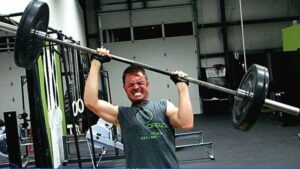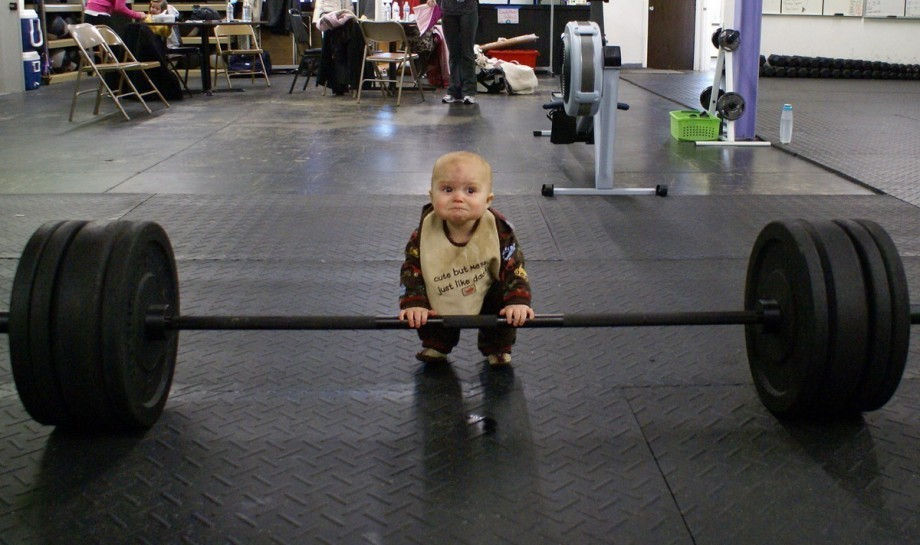How can I get back to CrossFit when I have Rotator Cuff related pain?
Why does my shoulder still hurt when I do Crossfit?
Shoulder-related pain is a common complaint among CrossFit athletes. The shoulder joint is a complex structure that is prone to injury due to its high mobility and demand in various CrossFit exercises. As a result, shoulder injuries are one of the most common injuries in CrossFit athletes accounting for 16% of all CrossFit related injuries. They generally fall into 3 categories- stiff and painful, weak and painful, hypermobile and painful.

Causes of shoulder pain in CrossFit athletes:
The shoulder joint is a complex structure that consists of the humerus bone, scapula, and clavicle. The rotator cuff muscles are responsible for stabilizing the shoulder joint yet being mobile enough to reach overhead for various activities. The following are some of the most common causes of shoulder pain in CrossFit athletes:
- Overuse: Overuse or tendinopathy injuries are common in CrossFit athletes due to the high volume and intensity of training. Shoulder pain can result from repetitive overhead movements such as snatches, jerks, and handstand push-ups. If increasing volume, with a high workload, keep it at a low weight and intensity for 3-4 weeks. This will allow the shoulder to adapt to the volume. If increasing intensity, keep the session short with ample recovery before the next session. These sessions are more taxing on your central nervous system.
- Impingement: Impingement occurs when the rotator cuff muscles are compressed between the humerus and the acromion. This can lead to pain and inflammation in the shoulder joint, the bursa and pinch the supraspinatus muscle. Avoid movements which involve upright row movements, and consider if it is related to a mobility, weakness or stiffness issue in the shoulder.
- Instability: Shoulder instability occurs when the joint is too loose, which can cause the humerus to move too much within the joint. This can result in pain, weakness, and even dislocation. Focus on creating lots of tension and muscular stiffness with exercises which isolate the rotator cuff, prime the shoulder with movements you will be doing during the workout, prioritise high volume, with a low load during CrossFit classes.
Prevention of Shoulder Injuries in CrossFit athletes:
Prevention is key when it comes to shoulder injuries in CrossFit athletes. Here are some tips to help prevent shoulder injuries:
- Warm-up: It is essential to warm-up before every training session. A proper warm-up should include mobility exercises for the shoulders, back, and hips.
- Proper technique: Proper technique is crucial when performing exercises that involve the shoulders. It is important to have a coach who can provide guidance and correct technique errors so seek their expertise. When fatigue kicks in, this is when technique drops and you are prone to injury.
- Strengthening: Strengthening the rotator cuff muscles can help prevent shoulder injuries. Exercises such as banded/weighted external rotations and internal rotations are great- but ALWAYS have the elbow supported otherwise you will not engage the right rotator cuff muscles. Scapular stabilization exercises can help improve shoulder stability with a focus on the lower trapezius muscle.
- Seek the support of your coach or physiotherapist, who can help guide you with a program to prevent, minimise or manage shoulder pain. Here at Pro Health Physio NE, we work alongside your coach to ensure you can continue training, with some adaptations, gradually returning to your normal training, classes, competitions and social circles.

Latest research on shoulder injuries in CrossFit athletes:
A study published in the Orthopaedic Journal of Sports Medicine in 2020 investigated the prevalence and risk factors for shoulder injuries in CrossFit athletes. The study found that shoulder injuries were the second most common injury in CrossFit athletes, accounting for 16% of all injuries. The study also found that athletes who had a history of shoulder pain were more likely to experience shoulder injuries in the future. If you have had a shoulder injury, consider doing some priming shoulder exercises before a class. Another study published in the Journal of Strength and Conditioning Research in 2021 investigated the effects of a shoulder injury prevention program on shoulder pain and function in CrossFit athletes. The study found that athletes who participated in the prevention program had a significant improvement in shoulder function and a reduction in shoulder pain compared to the control group. Silva et al (2022) found that the lower traps are a muscle that demonstrated lower EMG activity in those with shoulder pain. In conclusion, shoulder-related pain is a common complaint among CrossFit athletes. The most common causes of shoulder pain include overuse, impingement, and instability. Prevention is key when it comes to shoulder injuries, and athletes should focus on warm-up, proper technique, and strengthening the rotator cuff muscles. The latest research suggests that a shoulder injury prevention program can help improve shoulder function and reduce the risk of shoulder injuries in CrossFit athletes.
For further reading: 2022 Bern Consensus provides a great starting point for injury prevention, rehabilitation, and return to sport: https://www.jospt.org/doi/10.2519/jospt.2022.10952 What if I am not based in Newcastle upon Tyne?
Here at Pro Health Physio, we have extensive experience working with those with shoulder pain, rotator cuff pain, tendinopathy, calcific tendinopathy, cuff tears, impingement, biceps tendon pain, SLAP tears and many other shoulder conditions. We will guide you back to CrossFit, working alongside your coach to make it as seamless as possible. We offer virtual appointments if you are based outside of Newcastle or the UK. Our YouTube page has lots of shoulder rehab exercises which you may find helpful. For those who would like to access our Shoulders & Boulders program, please contact us via admin@prohealthphysione.com This is a self-led program, with simple explanation of exercises, video tutorials, rehab principles and progressive overload back to CrossFit.

